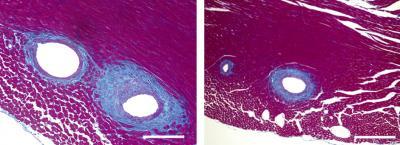Too much dietary fat is bad for the heart, everyone knows that by now, but not all fats are equal. The right kind of fat keeps the heart healthy, and a paper in The Journal of Experimental Medicine shows how it works.
Unlike saturated fats discussed in popular media, unsaturated dietary fatty acids, such as eicosapentaenoic acid (EPA), are known to protect against cardiovascular diseases. However, the mechanism and the specific fat metabolites responsible for this protection were unknown.
A group of Japanese scientists have now discovered that mice engineered to produce their own EPA are protected against heart disease and have improved cardiac function. One particular EPA metabolite, called 18-hydroxyeicosapentaenoic acid (18-HEPE), was required for this protection. 18-HEPE was produced by immune cells called macrophages, which dampened inflammation and fibrosis in the heart.
In a small study, treatment with 18-HEPE confirmed its heart-protective effects.
 Cardiac fibrosis was dampened in mice treated with 18-HEPE (right) compared with a control group (left). Credit: Endo et al., 2014
Cardiac fibrosis was dampened in mice treated with 18-HEPE (right) compared with a control group (left). Credit: Endo et al., 2014The researchers believed a diet enriched in 18-HEPE might thus help prevent heart failure in patients with cardiovascular diseases and the next steps are to pursue those avenues.






Comments